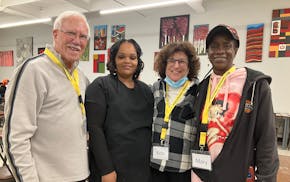When someone is transplanted from one side of the planet to the other, language is but the first of many barriers to cross-cultural understanding. Anyone who has become a refugee has likely experienced a trauma that will mark them for life, with healing a perpetual process.
For her work of nonfiction, "The Song Poet," Twin Cities-based writer Kao Kalia Yang placed herself inside the mind of her father, a Hmong man who fled Laos with his wife and started a family in a Thai refugee camp before moving to St. Paul when his daughters were young. And now Minnesota Opera has created a landmark production with its adaptation of the book, the first major opera to tell a Hmong story and employ elements of Hmong traditional music.
It premiered on Thursday evening at the Luminary Arts Center, and it is indeed a groundbreaking combination of an Asian story (and some musical elements) and a decidedly European art form. With a libretto by Yang and a score by Minnesota-based composer Jocelyn Hagen, it's an often fascinating opera that does ample justice to the life of a man with his feet planted in two very different cultures.
It's hard to escape the idea that Yang wrote "The Song Poet" in order to better understand her father and, by extension, the many Hmong Americans who made a similar journey. In that regard, this opera bears the burden of representing a culture that hasn't found a voice in such a high-profile setting as a production from a major American opera company.
So perhaps it's no surprise that "The Song Poet" steers well clear of being a "warts and all" portrayal of its Hmong characters. If they bear flaws, make mistakes, or have conflicts between and within themselves, they don't show up in this opera. Hence, Hagen's often very dramatic music can seem the lone means to reach inside the hearts of these characters.
But she receives an important assist from Yang's father himself. Bee Yang is presented as a man who has sung his way through life, or at least did prior to coming to Minnesota. And whenever a character sings something in Hmong without instrumental accompaniment, it's likely that Yang himself created some of those words and melodies.
It's to Hagen's credit that such sections blend beautifully with the rest of her music, which is engagingly executed by the cast of 23 and 14-piece orchestra, under the charismatic leadership of conductor Tiffany Chang.
Yet, there are issues with the story itself. The part of Bee Yang's life that best lends itself to the operatic tradition all takes place in Laos. It is there that he mourns a lost father, falls in love, flees from a war and comes to terms with the ongoing sense of loss that is part of a refugee's experience. The audience's emotional connection with the characters is enhanced by the deeply involving dance sequences created by Penelope Freeh and touchingly executed by Elliana Vesely and Cheng Xiong.
The second act, by contrast, lacks dramatic structure. While anthropomorphizing the machines that Bee Yang operates in a Brooklyn Center factory proves interesting, "The Song Poet" fizzles down the stretch. Yet baritone Museop Kim makes Bee Yang a compelling central character, complemented strongly by soprano Corissa Bussian as the woman who becomes his life partner, Chue Moua. They're particularly powerful during the first act's sweeping love arias, which provide this important work's most powerful moments.
Minnesota Opera's 'The Song Poet'
When: Through March 26
Where: Luminary Arts Center, 700 First St. N., Mpls.
Tickets: Sold-out, but tickets (at $50-$80) may become available. Call 612-333-6669 for information.
Rob Hubbard is a Twin Cities classical music writer. Reach him at wordhub@yahoo.com.
Orange crush: Boats packed with revelers tour Amsterdam canals to celebrate the king's birthday

